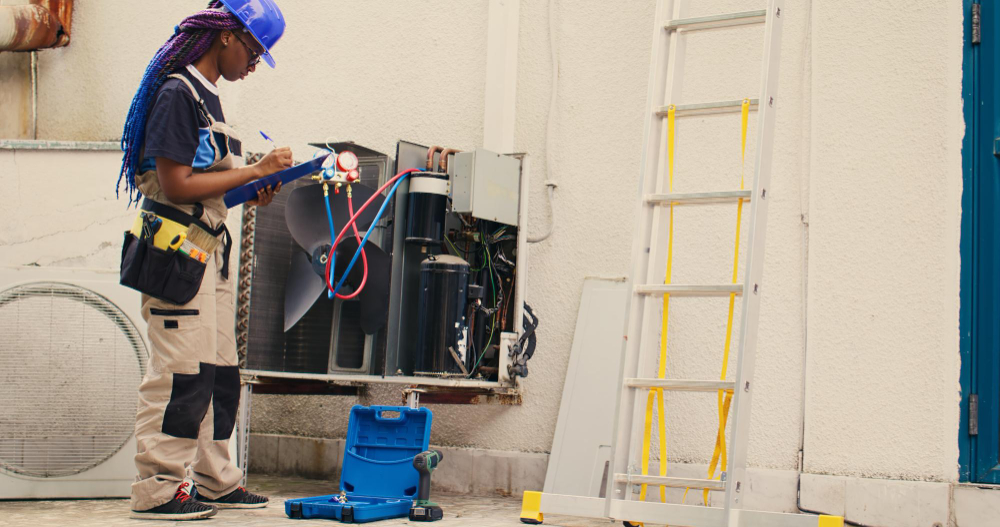
Your HVAC (Heating, Ventilation, and Air Conditioning) system plays a crucial role in maintaining indoor comfort throughout the year. However, its performance is directly influenced by external weather conditions. Whether it’s scorching summer heat, freezing winter temperatures, or fluctuating humidity levels, your HVAC system must work harder to maintain an optimal indoor climate. Understanding how different weather changes impact your HVAC unit can help you take proactive steps to ensure efficiency, longevity, and cost-effectiveness.
Impact of Hot Weather on HVAC Systems
During the summer months, your HVAC system works tirelessly to keep your home cool. Rising temperatures increase the strain on your air conditioner, leading to potential efficiency issues.
1. Increased Energy Consumption
When temperatures soar, your AC has to run longer cycles to reach and maintain the desired indoor temperature. This leads to increased energy consumption and higher electricity bills. The harder the system works, the more wear and tear it experiences.
2. Overheating of Components
Continuous operation in extreme heat can cause components such as the compressor and condenser coils to overheat. This may lead to system breakdowns or reduced efficiency over time.
3. Clogged Air Filters
Higher temperatures often coincide with increased dust, pollen, and other airborne particles. These can clog air filters quickly, reducing airflow and making your system work harder than necessary. Regular filter replacement is essential to maintain efficiency.
4. Refrigerant Issues
Refrigerant plays a crucial role in cooling, and during hot weather, any leaks or low refrigerant levels can hinder the cooling process. Regular maintenance checks can help identify and resolve refrigerant-related issues.
Impact of Cold Weather on HVAC Systems
Winter brings its own set of challenges for HVAC systems, especially for heating components like furnaces and heat pumps.
1. Increased Heating Load
Just as summer heat makes air conditioners work harder, freezing temperatures force heating systems to run continuously to maintain warmth. This increases energy consumption and operational strain.
2. Frozen Pipes and Coils
When temperatures drop too low, there’s a risk of pipes and coils freezing, leading to system inefficiencies or potential damage. Proper insulation and regular maintenance can help prevent this issue.
3. Thermostat Challenges
If your thermostat isn’t functioning correctly, your HVAC system might struggle to maintain a consistent temperature. Upgrading to a programmable or smart thermostat can help optimize heating efficiency in colder months.
4. Carbon Monoxide Risks
Furnaces that rely on gas combustion may develop issues such as cracked heat exchangers, leading to carbon monoxide leaks. It’s essential to have carbon monoxide detectors and schedule routine inspections to prevent hazards.
Effect of Humidity Changes on HVAC Performance
Humidity levels significantly impact HVAC efficiency and indoor comfort. Whether too high or too low, improper humidity levels can lead to problems.
1. High Humidity (Summer Months)
- When humidity levels are high, your AC works harder to remove moisture from the air, reducing its efficiency.
- Poor humidity control can lead to mold growth, musty odors, and discomfort.
- Using a dehumidifier along with your AC can improve air quality and reduce strain on your HVAC system.
2. Low Humidity (Winter Months)
- Cold air holds less moisture, leading to dry indoor conditions.
- Dry air can cause respiratory issues, dry skin, and static electricity.
- Using a humidifier can help maintain an optimal humidity level (around 40-50%) and improve comfort.
How Seasonal Changes Affect HVAC Maintenance Needs
Seasonal shifts require HVAC systems to adapt to different operating conditions. Regular maintenance is crucial to keep your system running efficiently.
1. Spring and Summer Maintenance
- Clean or replace air filters.
- Inspect and clean condenser coils.
- Check refrigerant levels and inspect for leaks.
- Ensure proper thermostat calibration.
- Inspect and clean air ducts for better airflow.
2. Fall and Winter Maintenance
- Inspect the furnace and heat exchanger.
- Clean and inspect vents and ductwork.
- Check for gas leaks or carbon monoxide risks.
- Ensure thermostat settings align with seasonal needs.
- Insulate pipes to prevent freezing.
Ways to Improve HVAC Efficiency During Weather Changes
Understanding the impact of weather changes on your HVAC system allows you to take proactive steps to enhance its efficiency and lifespan.
1. Upgrade to a Smart Thermostat
A smart thermostat adjusts temperatures based on usage patterns, ensuring optimal efficiency while reducing energy costs.
2. Seal Air Leaks
Proper insulation and sealing leaks around windows and doors prevent air loss, reducing the strain on your HVAC system.
3. Schedule Regular HVAC Tune-Ups
Routine professional maintenance helps identify potential issues before they become costly repairs, ensuring smooth operation year-round.
4. Use Energy-Efficient HVAC Systems
Consider upgrading to energy-efficient HVAC units that adapt to extreme weather conditions while consuming less power.
5. Invest in Proper Ventilation and Air Purification
Good airflow and air quality contribute to better HVAC performance. Installing air purifiers and ventilators can improve indoor air circulation and comfort.
Conclusion
Weather changes can significantly affect the performance of your HVAC system. Extreme temperatures, fluctuating humidity, and seasonal transitions may lead to increased energy consumption, system malfunctions, and higher maintenance costs. By understanding these impacts and taking preventive measures—such as regular maintenance, upgrading thermostats, and improving insulation—you can ensure that your HVAC system operates efficiently throughout the year. To keep your system in top condition and to avoid issues during changing weather, consider hiring HVAC repair services in Prosper.




Leave a Reply